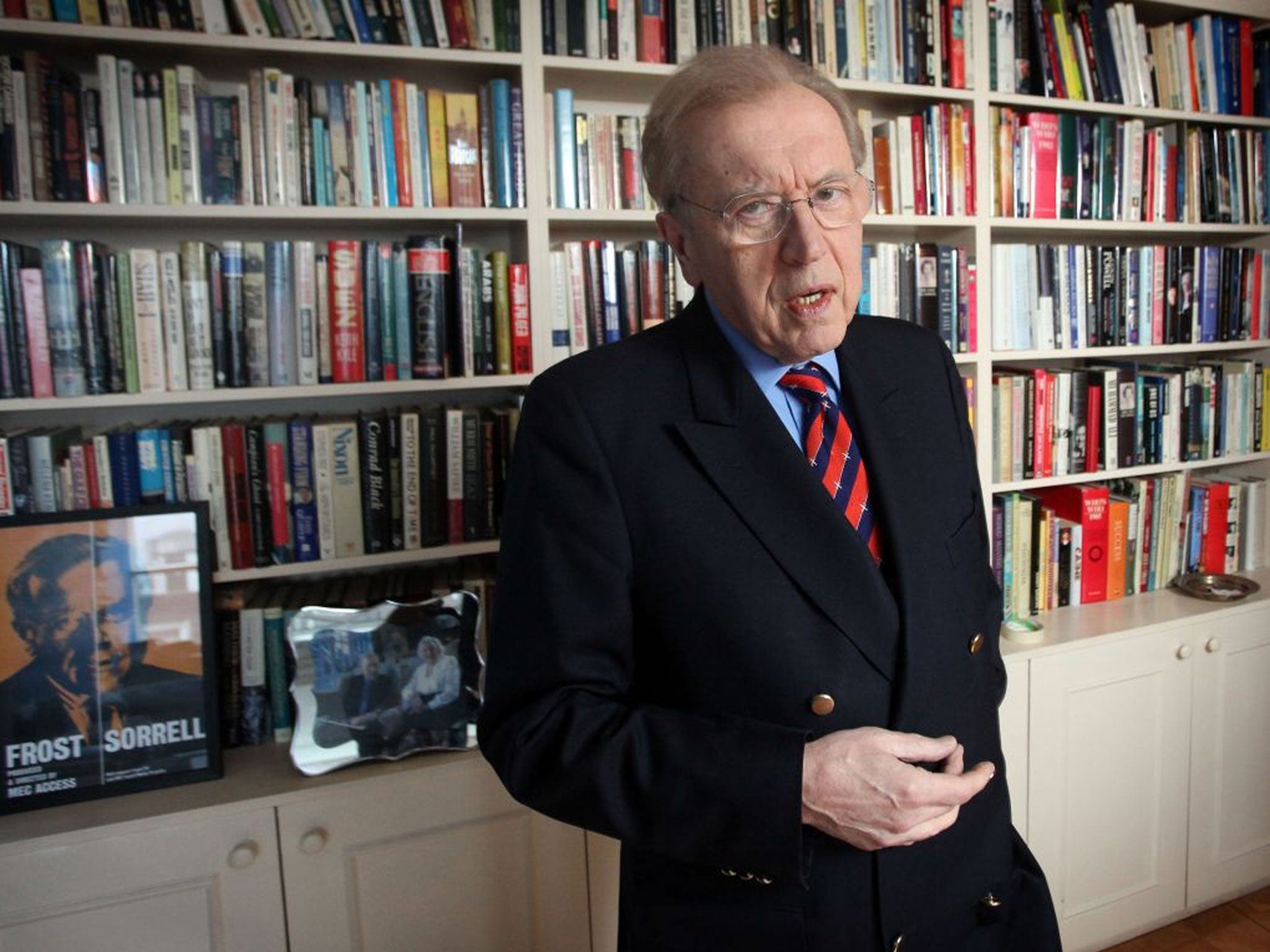'Once you take away the freedom of the press, it's very difficult to get back': Sir David Frost on Leveson, Michael Gove and political correctness
Exclusive: The man who conducted possibly the most famous political interview in television history, David Frost, now 73, gives his views on press freedom and British politics

Sir David Frost has been stewing over the Leveson debacle. “The press still needs liberating in some ways rather than being tied to a set of rules,” he says, hands crossed horizontally in that default position in front of his chin. “There is a real danger that the wrong sort of legislation will be brought up and the buggers will not be the targets… In a free society you’ve got to opt first and foremost for freedom of the press.”
The role of the media in his own life - and the impact he as a journalist has had on others - has been playing on Sir David’s mind of late.
This week marks 50 years of ‘That Was the Week that Was’, the show that launched his career. Not long out of Cambridge, aged 23 Frost was chosen to front the first satirical sketch show of its kind.
Now 73, he relives the memories seated in his bright blue office overlooking London, the base of his TV production company David Paradine Productions.
A pilot first caught the attention of BBC execs, Frost explains, after a group of Conservative ladies sat in the audience of a particularly rambunctious session and then lodged a complaint. The bigwigs called in to monitor the footage were bowled over by Frost’s quips on politics, religion and the Royals and signed the cocksure Footlights star straight up.
In the intervening decades, going on to front The Frost Interview before Through the Keyhole and latterly a programme for Al-Jazeera English, the ambitious reverend’s son went on to break some of the biggest stories of his time. When Fraudster Emil Savundra agreed to give the first interview to Frost, he told the reporter “Alright, you sharpen your sword and I’ll sharpen mine!’”. The insurance swindler was slaughtered.
It is a wonder, given his reputation, that his advisor’s allowed Richard Nixon anywhere near the languid interrogator.
Today, Frost is frailer and with a slightly less lustrous shock of hair than he once had. It is unclear whether his frequent um-s and ah-s and epic pauses are signs of a doddery mind or canny avoidance tactics. He has a tendency to drift off at tangents, but he is quick to respond to questions when it suits him.
Frost has just heard reports that Education Secretary Michael Gove’s son asked his father of Number 10 “Daddy, when you are Prime Minister will we have this place to ourselves?” “Are you sure he didn’t mean Parliament? That would be more ambitious!” he roars with laughter.
Could Gove make the next Prime Minister? “I think he’s a very promising figure… he’s been rehearsing for [his current] position for some years.. I think a year or two more in the cut and thrust of the Commons would make it possible for him to [become leader].” But don’t estimate the bounce-back-ability of Nick Clegg, he adds: “I suspect Clegg will be seen to have been somewhat underestimated… it’s a very tough balance act and he’s survived so far. The first prerequisite of staying in the job is to survive, that is the gateway to great leadership.”
If Frost was Prime Minster, his first area of attack would be education, “enabling more people to leave school with the told for the job”. His own children – he has three of them with wife Lady Carina Fitzalan-Howard, 20 years his junior – all went to Eton.
Next, he would move onto the structure of government itself: “You need to find a way to get away from having 8 ministers in one department in 10 years… people are just getting their feet under the desk and they’re off again to another job that will always seem illogical. Fewer reshuffles and better appointments in the first place.”
Finally, he would hone in on political correctness: “a dubious quality in our national life today”.
As for what the future holds for the next generation of hacks? Frost is unsure. Perhaps the current discontent - the lack of housing, jobs and prospects for school-leavers - will rise in their favour. His ambition was “an amalgam of things going on between 1956-1962.” From John Osborne’s Look Back in Anger to the Suez crisis, it was, he says, an “extraordinary period.”
There was an element of good fortune, too, to his success: “All the young at that time wanted a show like TW3, we were lucky enough to be the ones who thought of it… And there were lots of things about it that you couldn’t train for: how do you train in order to innovate?” he leans forward intensely and then shrugs and drops back into his chair.
But enabling programmes which challenge and “advance the position of the press as a watchdog,” he says, is crucial. Tighter controls, including super-injunctions “are more of a danger than a boon”.
In a free society, Frost concludes, cocking an eyebrow, “you’ve got to opt first and foremost for the freedom of the press…. Because once you’ve taken it away, it very difficult to get back”.
Join our commenting forum
Join thought-provoking conversations, follow other Independent readers and see their replies
Comments